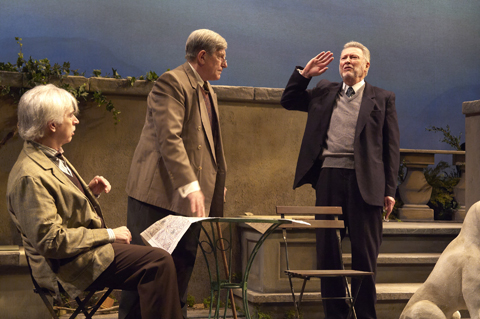
CROSSING OVER The three heroes of Heroes. |
In one sense, time is the most plentiful possession of World War I veterans Gustave (Edmond Genest), Henri (Munson Hicks), and Philippe (Philip Goodwin), who live together in a military retirement home in the French countryside. In another sense, as they know all too well, their time is ever shorter. The juxtaposition is the heart of Heroes, Tom Stoppard's adaptation of Gérard Sibleyras's light, slow, sweet comedy about aging, Le Vent des peupliers ("The Wind in the Poplars," literally). It is produced by Portland Stage Company, under the direction of Paul Mullins.
The three heroes of the title spend their long days on a certain favorite terrace, which they jealously guard from the intrusions of other residents, discussing the conspiracies of the nuns, the loveliness of the neighbor schoolgirls and their young teacher, and the question of whether the stone dog on the terrace is or is not animate. All three have their quirks and infirmities: Philippe still holds shrapnel in his head and is prone to fainting spells; the "born enthusiast" and bon vivant Henri has a limp; and Gustave, for all his ostentatious posturing, has become paralyzingly agoraphobic. And because all three feel trapped in quotidian banalities, in the face of their numbered days, they plan a last adventure: Escape from the retirement home — along with the stone dog — to the hill where poplars sway in the wind with seductive freedom.
The tone of their conversation and foibles moves between whimsically comic and gently lyrical, with dashes of salt: From grumblings over Sister Marguerite (suspected of offing people when more than one man share the same birthday), they shift easily into reveries — of the poplars, of "slim-ankled girls all around me like starlings" — with the occasional earthier quip: "Personally," Philippe remarks about relations with the fairer sex, "I think making them laugh is as important as making them climax." But never tell her that, scoffs Gustave: "She'll think you're going to divide your concentration and she'll drop you just like that."
Their verbal follies and mild physical comedy play out over yet another beautifully designed set by Anita Stewart, with a long terrace, faintly mossed with age and set with plants and simple patio furniture, and the soft, indistinct blues of a country sky behind (lighting design by Gregg Carville). The men clothes show their care and innocent vanity about their appearance in their ties, wool vests, and jackets, with Henri sometimes sporting military metals (Hugh Hanson's costume design).
The actors, all Equity, make distinct, affectionate eccentrics of the aged soldiers. Genest's Gustave has a warm, rascally streak, and Hicks nicely balances Henri's pompous pedantry with his deeply concealed trauma. Goodwin, with his slight frame and wispy white hair, is a perfect embodiment of the frail and easily distracted Philippe; as time wears on and his spells increase, he practically seems to blow in the breeze. Their rapport shifts easily through skirmishes, absurdity, fraternité, and silence, and the warmth of their laughter together is quietly affecting.